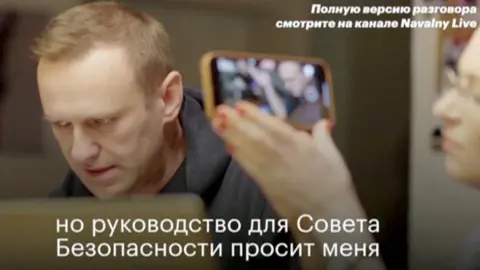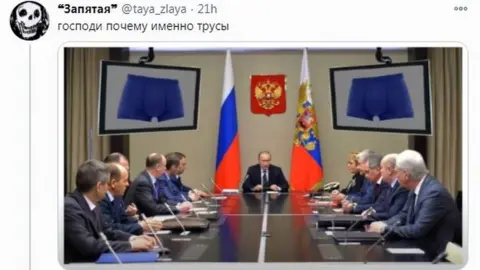Russia hits EU with sanctions in backlash over Navalny sting
 Reuters
ReutersRussia says it will deny entry to several EU officials and institutions in retaliation for EU sanctions linked to Putin critic Alexei Navalny.
Top diplomats from France, Germany and Sweden were summoned to Russia's foreign ministry and notified.
Mr Navalny released a recording on Monday in which he apparently tricked a Russian FSB state agent into revealing details of an attack on him with the nerve agent Novichok.
He almost died in the August attack.
The 44-year-old anti-corruption blogger, still recovering after weeks in intensive care in Berlin, posted the long recording of his conversation with the FSB agent on his YouTube channel on Monday. By Tuesday morning more than 13 million people had viewed it.
The Kremlin has repeatedly denied any role in the attack on Mr Navalny and rejects the Western allegation that he was poisoned with Novichok, an extremely toxic chemical that, experts say, could only have come from a Russian state facility.
'Delusions of persecution'
In the recording, Mr Navalny posed as a senior Russian security official on the phone, and got the FSB agent, Konstantin Kudryavtsev, to reveal that Novichok had been planted in a pair of Mr Navalny's underpants.
Mr Navalny collapsed on a Russian airliner, and Mr Kudryavtsev told him the swift response of the pilot and emergency medical team in Omsk, Siberia - where Mr Navalny was first treated - could have been the reason for the failure to kill him.
The agent said he was sent to Omsk later to seize Mr Navalny's clothes and remove all traces of Novichok.
It has spawned tweets by Russians pursuing the underwear theme and punning on the Russian for underpants - "trusy" - which also means "cowards".
 Twitter/@taya-zlaya
Twitter/@taya-zlayaKremlin spokesman Dmitry Peskov lashed out at Mr Navalny on Tuesday, saying he had "delusions of persecution", "traits of megalomania" and "shows a Freudian fixation on his own groin area".
Vladimir Putin - whom Mr Navalny has bitterly criticised for years - headed the FSB before becoming Russian president in 2000.
The recording was released a week after investigative group Bellingcat named several FSB agents who it said had tailed the Kremlin critic for years before the Novichok attack. President Putin blamed US intelligence and claimed if the FSB had wanted to kill Mr Navalny "they would have carried it through".

Huge embarrassment for Kremlin

The FSB is one of the successors to the old Soviet KGB. It likes to project an image of professionalism and strength.
One telephone call has dealt that a huge blow.
FSB agent Konstantin Kudryavtsev fell for the trick hook, line and sinker. Believing he was talking to a security official, he told Alexei Navalny all about the operation to kill him.
Social media in Russia is bursting with images of underpants and comments mocking Agent Kudryavtsev and the FSB for cleaning Mr Navalny's underwear.
As you might expect, the security agency says the recording is "a fake", "a provocation" by foreign intelligence services.
In reality, it is a huge embarrassment. Not only for the FSB, but for the Kremlin, which has consistently denied that Russia's most prominent opposition figure was the victim of a poisoning.
Alexei Navalny accuses President Putin of ordering his assassination. And the investigation by Bellingcat and The Insider, and this telephone recording, strengthen Mr Navalny's claim that he was targeted by the Russian state.

On 15 October the EU imposed travel bans and asset freezes on six top Russian officials and a Russian chemical weapons research centre, accusing them of direct involvement in the poisoning of Mr Navalny.
Among them is Andrei Yarin who, the EU says, heads a task force in Mr Putin's administration which harasses Mr Navalny and seeks to discredit him. FSB chief Alexander Bortnikov is also on the EU blacklist.
It is not yet clear which EU "representatives and institutions" - as the Russian foreign ministry puts it - will be subject to Russian sanctions.
But the German foreign ministry made clear the Russian response was unjustified as it was not a "bilateral case". The incident "remains a case of international dimensions due to the violation of international law with the use of chemical nerve agents", it said, adding that so far Russia had "shown no willingness" to clarify the use of nerve agents.
Mr Navalny has millions of followers on social media, where he denounces Mr Putin's United Russia party as deeply corrupt and full of "crooks and thieves". He says Mr Putin runs a "feudal" system of patronage "sucking the blood out of Russia".
In the summer, before the August poisoning, Mr Navalny campaigned to get several of his supporters elected to councils in Siberia.
Security and arms expert Mark Galeotti told BBC Russian that no-one should conclude from the Navalny video that "Russia is an incompetent country filled with semi-educated agents", pointing out that the Bellingcat investigation coincided with a large-scale hacking of US government agencies.
